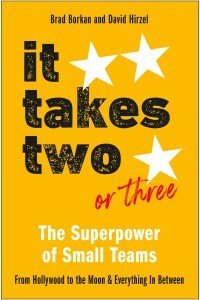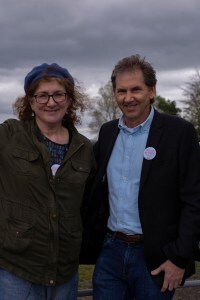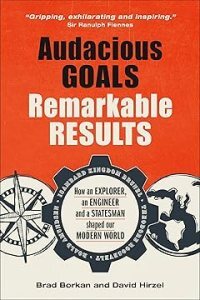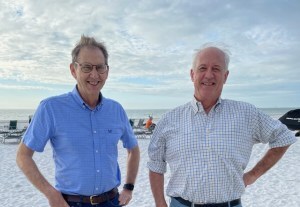In Conversation with Brad Borkan and David Hirzel About the Art of Co-Authoring
Today I’m pleased to welcome not one but two guest authors to my “In Conversation” series. Decision science expert Brad Borkan and maritime historian David Hirzel are going to tell us about their collaboration as authors of inspiring history books about decision-making, including their most recent title, appropriately enough It Takes Two or Three – The Superpower of Small Teams.
 I first met Brad Borkan, an American living in London, back in 2017, not long after he and David Hirzel, based in the USA, after they’d launched their first book, When Your Life Depends On It: Decision-Making Lessons from the Antarctic. I was immediately attracted to the premise, drawing on the experience of early twentieth-century polar explorers, and I devoured the book.
I first met Brad Borkan, an American living in London, back in 2017, not long after he and David Hirzel, based in the USA, after they’d launched their first book, When Your Life Depends On It: Decision-Making Lessons from the Antarctic. I was immediately attracted to the premise, drawing on the experience of early twentieth-century polar explorers, and I devoured the book.
 The gloomy weather didn’t spoil our fun at the 2018 Hawkesbury Upton Literature Festival (Photo by Angela Fitch Photography)
The gloomy weather didn’t spoil our fun at the 2018 Hawkesbury Upton Literature Festival (Photo by Angela Fitch Photography)When I eventually met Brad in person, possibly at the London Book Fair, I knew he’d be an articulate and engaging speaker at my Hawkesbury Upton Literature Festival. Even though he’d just been taken on by a public speaking agency planning to hire him out at thousands of pounds on the after-dinner circuit, he generously agreed to be a special guest at our 2018 event. The audience loved him – and he loved the Festival. Talk about win-win!
I’ve followed Brad’s author and speaking career ever since, and I have enjoyed his and David’s two subsequent books too. Having just finished reading their latest, I thought it was about time I invited them onto my blog to share with you the secrets behind their success – and because I was keen to know just how their co-writing partnership works. Here’s our resulting conversation.
Debbie: Brad and Dave, please tell me a little about your background before you became a writer.
Dave: There was never a time before my becoming a writer. I have remnants of little kid-books that I put together in first or second grade, but I started to get serious about it in 1994 when I sat down to write the polar explorer biography trilogy of Tom Crean (that finally all saw print by 2015). To pay the bills, I do residential architectural design here in California.
Brad: Prior to becoming an author, I worked for large software companies. It was a difficult decision to leave the comfort of that to pursue my goal of being a full-time author, but I am glad I did.
Debbie: Please give a short description of the premise of your new book on small teams.
Dave: As we were researching true stories about incredible achievements, we noticed that often some of the most world-changing events came about when two – or at most, three – passionately dedicated minds join forces. The more we investigated this connection, the more we saw this same phenomenon across all realms of human endeavour, hence the title of our newest book: It Takes Two or Three – The Superpower of Small Teams: From Hollywood to the Moon & Everything in Between.
Of the hundreds of teams of two or three that came under consideration, we’ll share just a few here to help you get the idea:
The Wright BrothersGilbert and SullivanLennon and McCartneySusan B. Anthony and Elizabeth Cady Stanton (women’s rights campaigners in the 1800s)Peary and Henson (Arctic explorers)and teams of Apollo astronauts.Debbie: How did you first meet each other?
Brad: We first met at an Antarctic conference in 2015, amusingly called the ‘South Pole-sium’. It was held in a remote part of Scotland where Captain Scott’s grandson lives. To kick off the conference, each person was asked to stand up and explain why they were there. In the audience were esteemed historians, polar adventurers, descendants of the famous polar explorers, collectors of polar books, scientists, authors, and other accomplished people.
Since I was sitting near the front, I was one of the first to speak. I explained that I was fascinated by the decisions the early Antarctic explorers made on the ice and seeking a co-author for a book I envisioned writing. Dave was sitting towards the middle of the room and when it was his turn to speak, he explained he had come to meet old friends and make some new ones, as well as to launch Antarctic Voyager: Tom Crean with Scott’s Discovery Expedition 1901-1904. As I recall, Dave said, “I am interested in what Brad’s interested in – the decision making of the explorers.” I decided to talk with Dave as soon as there was a break.
 Brad and Dave’s first collaboration
Brad and Dave’s first collaborationDave: Being in between writing projects is a pretty rare occurrence for me, when I heard Brad say he was looking for a co-author to weave together the true stories from the heroic era of Antarctic explorer with the process of decision-making, I thought, I’ve got to meet this guy. So I did, and by the time the conference was over we had agreed to work together, and actually started committing the very first words to paper. Well, to a Word file specifically.
Debbie: Why did you decide to co-write?
Brad: When Dave and I first met at the conference, I explained that to make the book I envisioned successful, I needed to work with an historian who knew more polar history than I did. Dave probably thought I was nuts, but he humoured me. I promised that when I returned to London, I’d email him all of my notes for the book to spark his interest. Dave turned out to be the perfect writing partner.
Dave: It seemed like a great idea for a collaboration. I’d never co-written with anyone, and this seemed like a great opportunity to look at the world through a different lens: decision theory. And make a new friend. Brad’s the idea guy. Also the one with business acumen.
Our process, such as it is, evolved organically around a general idea of trying to share the work equally. The internet makes all this possible, sharing drafts back and forth across the Atlantic.
Debbie: How did you choose the topics and themes of your books?
Brad: There’s an old saying that authors write the books that they wish they could read. That’s true for us. We look at a topic and ask if it thrills us enough to devote years to researching and writing about it.
We have now co-written three books and are currently working on our fourth. As mentioned, the first dealt with the life-and-death decisions the early Antarctic explorers made on the ice, When Your Life Depends on It.
Our second is about three epic achievers: Isambard Kingdom Brunel, Teddy Roosevelt (Panama Canal and National Parks) and Roald Amundsen (first through the Northwest Passage and first to the South Pole). That book is called Audacious Goals, Remarkable Results.

Our newest book, It Takes Two or Three – The Superpower of Small Teams, launched in 2024. Lots of people talk about the importance of teamwork but this is the first book that gives many real historical examples and explains the mindset of the team members.
We decided we were well placed to write this book because even though we are not yet famous, we are a good representation of what we think a small team should be.
 Brad Borkan (left) and Dave Hirzel
Brad Borkan (left) and Dave HirzelDebbie: In It Takes Two or Three, you talk about the defining factors of a fruitful working partnership in small teams – which factors apply to yours?
Dave: Successful partnerships are built on trust and a shared belief that the outcome of any endeavour will be worth the effort put into it. Many of the teams we looked at endured physical and financial hardships that would have intimidated those with less dedication to their goal.
As almost all the examples we cite in our book illustrate, the goal has to be something more meaningful than the acquisition of more money. Our subjects are more interested in solving the unanswered questions of the world:
How can we get the right to vote for women?How can we get home after our ship’s been wrecked?Can you change the way people think through the music that you write?Shared hardships and commitments reinforce each other to strengthen the team’s resolve. Writing a book can be a pretty intimidating goal. In our case, once we have divided up the work, we tend to spur each other on, making commitments to be kept when edited chapter drafts are expected.
Debbie: In your book, the teams you describe are usually working in close proximity, yet you two collaborate from opposite sides of the globe. To what extent is geographical proximity necessary in the age of the internet? What are the pros and cons of working so far apart physically?
Dave: All the teams we studied had to figure out on their own how to get their work done. Physical proximity in Scotland was how we met. On rare occasions (maybe once a year) we can meet up somewhere. We talk on the phone a couple times a month.
Since our books always have an element about polar exploration, Brad in London has access to the many Antarctic resources that abound in England, plus he can keep regular personal contact with many people that I would love to get to know better. So I get a vicarious thrill when he has lunch with, say, Alexandra Shackleton, grand-daughter of the great explorer.
Debbie: Writing a book together is a very specific form of team-working. What are your top tips for any fellow writers who are considering it?
Brad: We recommend two things:
Do not get bogged down in legal agreements. Our theory is that you could spend a fortune on lawyers before you write a word and that could break your partnership before it even gets off the ground. Even today, all we have is a Memo of Understanding. If we ever became wildly successful maybe we’d seek more clarity.For the first 1-3 months focus only on the table of contents. What’s in the book and what’s not. Once that is defined, it will become clear who is best placed to pen the first draft of each chapter.Dave: Probably a good idea to actually know the person you’re taking up a collaboration with. Our example of meeting and diving into the work two days later is not likely to be often repeated. You have to be able to communicate with your partner clearly, and specify your own desires and intentions into a memo of understanding that will codify some of the more critical aspects of working together.
If you’re setting out, like we were, on a collaboration as authors of books, forget about making any meaningful amount of money for your work. Your goal should not be to become rich and famous from your writing work, but to tell the story you have in mind in the best way you possibly can.
Debbie: Fiction writers in particular often co-write at least one book with another author in their genre for marketing purposes – to introduce the other to each other’s audiences – but they’re still relatively few. Is this a valid reason for co-writing, or are such self-interested motives unhelpful?
Dave: Chain retail booksellers like Barnes and Noble have no shortage of new books co-written by a famous author—say, James Patterson or Robert Ludlum—and someone else. To me these are clearly marketing approaches rather than the meeting of two minds to craft a compelling narrative together. But since I don’t read popular fiction, I can’t really critique how artistically or financially successful such harnessing of two otherwise unlikely partners might be.
Brad and I deal with history, with facts. Since we can’t make things up, we rely on the amazing true stories to tell themselves, with a little help from us.
Debbie: Speaking about the practicalities, please describe the process you use to co-write your books. How do you divide the responsibilities and the labour?
Dave: We talk on the phone a couple times a month, kicking ideas around. At the start, we get a general idea of chapter themes and ordering. Twelve chapters (plus introduction, conclusion, front and back matter) seems about right. We each pick six chapters, write them on computer where we live (California and London), share them back and forth using Word, editing as we go until by the end it is no longer clear whose chapter is whose.
Brad manages most of the business matters for our subdivision of Terra Nova Press, an imprint based in Pacifica, California, that I own. Eventually, the book is in something like a final order, and Brad sends it off to eminent historians for fact checking, and then to one or more professional editors we trust, to whip it into shape and make it sound like it was all written by one person. This is an iterative process, and sometimes requires three or four edit cycles before we are satisfied.
We take great care in what our books look like. Since our books include photographs and maps, the book’s interior and cover design are created by one of the UK’s leading book designers. The audiobook follows a slightly different process as described in one of the answers below.
Although we self-publish, we do everything a big publisher would do to create a high quality book filled with the most amazing stories and insights.
We’re happy with the way we’ve set up our work.
Debbie: Does co-writing speed up the writing and production process or slow it down, compared to writing on your own, and how?
Brad: This is a good question and our answer may surprise readers. It does neither. We have only one overriding interest. Making our books as good as possible – ensuring they filled with compelling, fascinating, true stories about epic people like Shackleton, Brunel etc.
We know that together we can produce a far better book than either could do on our own.
Each of our books takes 2-3 years to research and write, but neither of us are working on them full-time since we have other commitments.
Dave: We are not in any hurry. No need to speed things up or slow them down, everything will take whatever it takes. The main thing is to look at your work when you consider it to be done and think, “that’s what I wanted it to do.”
Debbie: What do you know now about co-writing that you wish you’d known when you were starting out?
Brad: That it is the fun of brainstorming ideas with a like-minded person. Though we rarely see each other since Dave is in California and I’m in London, we have fascinating phone calls.
Both of our lives have been enhanced by our co-writing process.
Dave: Since our work together has been so intellectually rewarding, I can’t think of a single thing I wish I’d known about.
Debbie: You cite a wide range of examples of collaborators in your book, and I suspect everyone will have personal favourites. (Mine was the Wright Brothers.) Can you single out one or two that have been particularly inspiring to you in your line of work?
Brad: My inspiration has been the co-author pair Larry Collins and Dominque Lapierre. People may not recognise their names but might know their books. They co-wrote Is Paris Burning?, O Jerusalem!, and Freedom at Midnight. These are some of the best historical, non-fiction books I have ever read.
That was the model I was seeking in our co-author partnership. As for the favorite team in our It Takes Two or Three – The Superpower of Small Teams book, I am in awe of the two American women who championed women’s rights in the 1800s: Susan B. Anthony and Elizabeth Cady Stanton. They persevered in ways that were every bit as exciting as the early explorers seeking the North and South Poles, and Hillary and Tenzing on Everest. Every single right that women have today in the US, UK and elsewhere stems from the work of Susan B. Anthony and Elizabeth Cady Stanton.
Dave: My fascination is with the polar teams. I find it so interesting, that from the moment of their most dynamic shared triumph near, but not at the North Pole, Admiral Peary and Matthew Henson never spoke to each other again. The Antarctic teams – Shackleton and Wild, and Bowers, Wilson, and Cherry-Garrard of the Winter Journey – all shared something truly without parallel, a harmonious working and personal relationship that blossomed in the most forbidding of landscapes.
Debbie: I heard you went to a Hollywood award event because of one of your audiobooks. That sounds exciting. Can you tell us more?
Brad: Yes. The narration of the audiobook of our first book, When Your Life Depends on It: Extreme Decision Making Lessons from the Antarctic, was a finalist in the Voice Arts Awards in the History category. Voice Arts are awards for the spoken word, in the same way the Grammys are for music and Oscars are for movies. The reason our book was chosen was that I focused on finding the absolute perfect voice actor to record our audiobook. I listened to over 100 voices before selecting Dennis Kleinman. He had a deep, rich resonance to his voice that I thought must have matched what the early Antarctic explorers would have sounded like.
To make a long story short, Dennis and I attended the red carpet event at Warner Brothers Studios in Hollywood. (Dave was unable to attend.) The event was hosted by big names including Sigourney Weaver. It was the single most thrilling event of my author career, even though our book lost to Cosmos by Carl Sagan. Dennis has become a great friend and has recorded our other audiobooks.
Debbie: For three books you have co-written, the common theme is remarkable human achievements against the odds. You mention towards the end of book 3 that you have several more joint books in the pipeline. Would you care to expand on these plans to whet readers’ appetites? Are any available to pre-order yet? If so please provide a link.
Brad: We are currently working on a book that focuses on what we have learned from the 10 years of working together. We are looking forward to launching that book in early 2025.
Dave: We have other ideas as well, including differing ways that we can put our minds together and share our ideas to reach a wider public. Books are only a part of that process. The rewards of the partnership are what really counts.
Huge thanks to Brad and Dave for sharing these fascinating insights with us.
If you’d now like to read the books or buy them as gifts (they make great Christmas presents!), visit their website for more information here:






